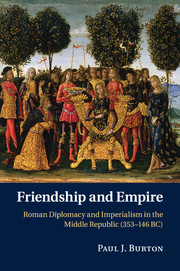Book contents
- Frontmatter
- Contents
- Preface
- Abbreviations
- Chapter 1 Discourse, International Relations, and International Relations theory
- Chapter 2 Friendship practices and processes
- Chapter 3 Amicitia incipit: beginning international friendship
- Chapter 4 The duties of international friendship
- Chapter 5 The breakdown and dissolution of international friendship
- Conclusion
- Bibliography
- Index
Conclusion
Published online by Cambridge University Press: 05 December 2011
- Frontmatter
- Contents
- Preface
- Abbreviations
- Chapter 1 Discourse, International Relations, and International Relations theory
- Chapter 2 Friendship practices and processes
- Chapter 3 Amicitia incipit: beginning international friendship
- Chapter 4 The duties of international friendship
- Chapter 5 The breakdown and dissolution of international friendship
- Conclusion
- Bibliography
- Index
Summary
After the dust and ash settled over the smoking ruins of what were once the flourishing cities of Carthage and Corinth in 146 bc, outside observers could have been forgiven for suspecting that a new era of Roman imperialism had begun, and that the golden age of Roman friendship diplomacy was well and truly over. Whether this is true or not will have to await further detailed study of the processes and practices of Roman international amicitia in the Late Republican and Imperial periods. It should be noted, however, that no source for these periods ever refers to Rome's partner states as clientes, or reduces amicitia to a polite euphemism for clientela. Times changed, the realities of power shifted, but discourse endured. As Jon Lendon has exhaustively documented, the language of Roman diplomats and the representatives of foreign states, kingdoms, and peoples throughout the succeeding centuries of Roman civilization and beyond stubbornly retained the language of honor, status, prestige, shame, emotion, morality, and friendship. The content of that discourse was constitutive of how the Romans and others saw themselves and their world. It also contributed to the construction of the international system itself.
Over the course of the preceding chapters, I have tried to show that international friendship discourse was especially important in the first great era of Roman transmarine expansion in the Middle Republic, since it contributed to the development, expansion, and consolidation of Roman power across the period. Between roughly 264 and 146 bc, the Romans somehow managed to refashion the entire Mediterranean system, a dangerous, war-prone, and violently anarchic environment, into a shape and substance that was more congenial to themselves and their own most pressing national security concerns. Whether by design or accident, the effect of this activity was more security for more states, gradually tilting the nature of the system away from violent anarchy to a more stable collective-security regime. The native ability of Italian troops, the style of training they underwent, the Roman Republican constitution, the enormous resources and favorable position of Italy, and perhaps even an unusually stubborn and determined Roman national character may go some way towards answering why and how it was the Romans, and no other ancient imperializing state, that achieved this (cf. Polybius’ sixth book). The peculiar rituals of Italian warfare and peacemaking, the inclusive nature of Roman citizenship statuses, and, as this study has shown, the language and habits of mind the Romans used to discuss and describe their world, as well as to engage with it, must surely also have played a significant role as well.
- Type
- Chapter
- Information
- Friendship and EmpireRoman Diplomacy and Imperialism in the Middle Republic (353–146 BC), pp. 354 - 357Publisher: Cambridge University PressPrint publication year: 2011

